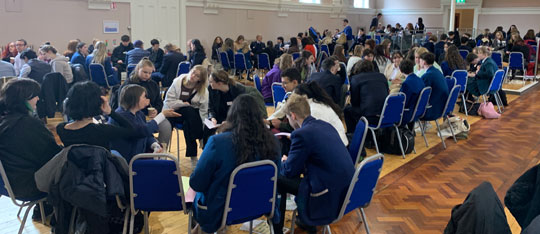By Michael Davies
On 27 February 2023, the day the Windsor Framework was agreed between the UK and the EU with the encouragement of US President Joe Biden, 200 high school students from eight European countries met in Maynooth University to debate Irish history. They did so in a spirit of openness and mutual respect, which would have been much admired, and perhaps envied, by their political leaders in Belfast that day.

This was part of a programme run by the educational charity Parallel Histories to encourage young people to study competing historical narratives and to see national histories within a wider European context. ‘We’ve been debating the rights and wrongs of the partition of Ireland and it’s been interesting to hear what the German and Belgian students had to say, as well as the Irish students. We all come with some pre-existing ideas even if we don’t realise it,’ said one student from Lancaster Royal Grammar School in England. Andrew Dermody, Head of History at St Finian’s College, Mullingar, and a trustee of Parallel Histories Ireland, added:
‘I’m really excited to be linking with schools in England and Northern Ireland on such a contentious topic that creates great debate, even a hundred years after the formation of the state. With talk of a border poll and perhaps a united Ireland coming in the future, I think it’s essential for students throughout the island to have a real awareness of the opposite side to what their viewpoint may be.’
Parallel Histories, which was set up in 2017, was inspired by my experience as a history teacher in Lancaster Royal Grammar School. I was looking for a better way to teach the history of Israel and Palestine. Two things struck me: first, the topic of Israel and Palestine was becoming increasingly difficult to teach because there was no accepted ‘middle ground’ and teachers felt vulnerable to accusations of bias; second, when I tried to teach ‘neutrally’, I was ‘diluting’ each side’s story so that my students couldn’t understand why the quarrelling parties hadn’t already gotten around the table and agreed a compromise. When, on the other hand, I started explaining the history as two competing historical narratives rooted in ethnic and religious identity, the students began to understand why the conflict has persisted.
In relation to Northern Ireland, I was very struck by something a teacher from a loyalist area said. She’d asked a talented pupil why he hadn’t picked history as one of his GCSE options and was told: ‘School history is nothing like the history I get at home and miss, to be honest, I like the history I get at home better’. To understand the conflict, you have to understand the competing historical narratives. And it gives students a far more interesting classroom experience.
Brian Whelan, who teaches history at Sacred Heart in Drogheda, is a big supporter of the approach:
‘We’ve been using the Parallel Histories method for three years. We’ve developed our own programme for Transition Year based on their scheme of work about Israel and Palestine which really encourages individual student research. Our students are really engaged and it’s made them sharper in critiquing the other history we teach. They can certainly see the parallels between one conflict and another.’
Theresa Cullinan, who teaches history at St Genevieve’s High School, Belfast, added:
‘We took our students to a conference Parallel Histories organised in Stormont in September last year, where they got to debate the causes of the Troubles with Protestant schools, and that was very interesting for them. Here they’ve been mixing with schools from the South, and that’s been very interesting too, as they can see that there are both similarities and differences in the way the history of Partition has been taught.’
Jamie Reynolds, a history teacher from Lancaster Royal Grammar School, reflecting on the conference said:
‘We all know we have national blind spots about our history but I’ll admit I’ve been surprised by quite how differently Oliver Cromwell is viewed by my Irish colleagues. I teach him to younger year groups and it’s very much “Oliver as the defender of Parliament”—if there is a debate about him, it’s about his puritan excesses: did he ban Christmas? It’s fascinating to view Cromwell through an Irish lens, as a colonial tyrant.’
Parallel Histories now works with over 700 schools worldwide; while the bulk of those are in Europe, the USA is its fastest-growing market. We are working with a team of US teachers and there’s a real appetite to use history teaching to fight fake news, alternative facts and conspiracy theories. And in terms of curriculum development, we are trying to create history programmes that teach about race in a way that is acceptable in both red and blue states.
Lorraine Glynn, who teaches history and English at St Joseph’s Secondary school in Tulla, Co. Clare, and is also a trustee of Parallel Histories Ireland, wholeheartedly agrees with the importance of discussing controversial topics in the classroom:
‘We need to debate our shared future on the island and that means we have to understand that there are very different views of the past. This is an opportunity for us to look at the question from different perspectives and engage in constructive dialogue. I think this makes my students not just better historians but better citizens too.’
Michael Davies is the founder and director of Parallel Histories.
